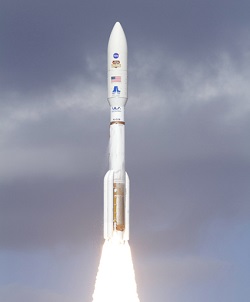Sarah Day fills you in on some geology news stories you may have missed
Day, S., Lift off! Geoscientist 30 (7), 5, 2020
https://doi.org/doi: 10.1144/geosci2020-096, Download the pdf here
 It took a historic space launch – the first time a private vehicle has carried astronauts to the International Space Station – to break through the gravitational field of coronavirus news. The launch of the SpaceX Falcon 9 rocket and Dragon crew capsule in late May was a welcome relief from what is still a fairly relentless news cycle and – whatever your thoughts on space programme spending, and SpaceX’s controversial founder – an undeniably positive news story.
It took a historic space launch – the first time a private vehicle has carried astronauts to the International Space Station – to break through the gravitational field of coronavirus news. The launch of the SpaceX Falcon 9 rocket and Dragon crew capsule in late May was a welcome relief from what is still a fairly relentless news cycle and – whatever your thoughts on space programme spending, and SpaceX’s controversial founder – an undeniably positive news story.
News – and science – hasn’t stopped during the Covid-19 crisis, but it has been somewhat overshadowed. You can’t have missed the SpaceX news, but you could be forgiven for missing, for example, the discovery of 90 million year old tree roots in Antarctica (early April), the news that the North magnetic pole’s wanderings might be caused by two ‘metallic blobs’ on the surface of the core (early May), or the discovery of fossil tracks from the early Cretaceous that suggest some ancient crocodiles may have moved around on two feet and ‘run like ostriches’ (early June).
Among my favourite of the geology stories that might, thanks to coronavirus, not have received the attention they deserve, was the international team of researchers who revealed in May that simulated Martian mud volcanoes flow ‘like boiling toothpaste.’ The surprising discovery was made by an international team of researchers whilst, according to the BBC, ‘playing with muck in the laboratory.’
Whilst research has continued, the challenge of how to hold conferences remains. In this month’s issue, Cathy Hollis, Stephen Lockier and colleagues recount how a successful international meeting was held remotely in the midst of lockdown, and argue that we need to rethink how international conferences work – an opportunity that could bring many benefits alongside inevitable challenges.
Meanwhile, after the success of SpaceX we have another launch to look forward to, in the shape of the NASA Mars 2020 mission. The launch window for the aptly named ‘Perseverance’ rover’s journey to Mars opens up on July 30th – no doubt timed to coincide as far as possible with the Geological Society’s 2021 Year of Space.
I love a geology news story at the best of times, but particularly now. Unlike a lot of news, it’s almost impossible to link geology stories to the current pandemic, and as such they’re a welcome escape from an all-consuming news cycle. Astronauts Doug Hurley and Bob Behnken must be feeling even more relieved – there’s surely rarely been a better time to temporarily leave the Earth’s atmosphere. For those of us left behind, I recommend setting up a Google alert for ‘geology’ and seeing what pops up.
It’s not all a blessed relief, though – in early May, we learned that the UK lockdown brought about an ‘unprecedented seismic quiet’, with seismometer stations detecting a significant fall in ground vibrations linked to human activity. Which might not sound very exciting, but it’s hoped that this could be a unique opportunity to study seismic activity which is usually – like so many science stories this year - buried amongst the noise.
You (possibly) heard it here first.
Sarah Day, FGS
@geowriter